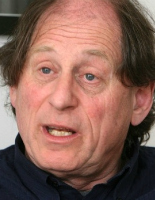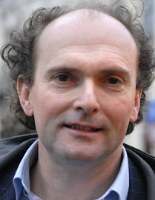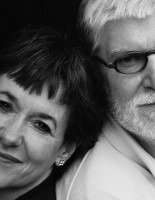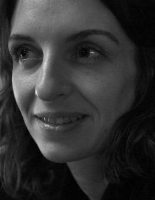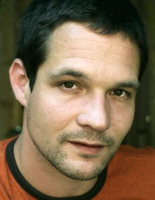Salomon Kroonenberg, Dutch writer
Writers explore the boundaries
The Dutch programme at the International Book Fair in Beijing was cunningly devised. The organisers, Tiziano Pérez and Bas Pauw, had placed pairs of poets together: Douwe Draaisma and Bernlef discussed memory, Anna Enquist and the female writer Xu Kun turned out - to their own great amazement - both to be football enthusiasts, and Margriet de Moor and myself found surprising things in common concerning the storm disaster in South-West Holland in 1953.
‘Let us get back to the literature,’ he said.
But probably the best pairing of writers was that of the Iranian-Dutch writer Kader Abdolah and the Tibetan-Chinese writer A Lai. Both of them have carved out a literary career in a cultural background different from their own. Kader told his audience that he was not allowed to write what he wanted to in Iran, and for that reason he fled to the Netherlands. ‘Now I feel like an astronaut,’ he said,’ I can fly in any direction I like. Can you also do that, A Lai? Can you be yourself as a Tibetan writer?’ he asked his colleague.
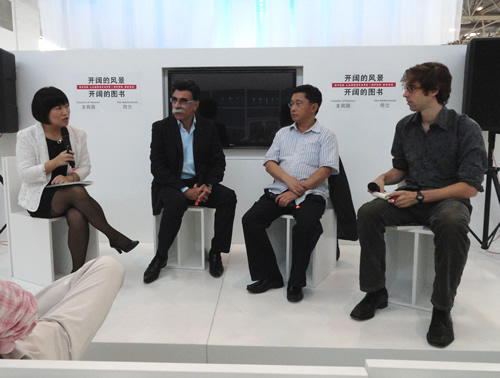
A Lai related that he had learnt Chinese from primary school onwards, so that he had not had such a dramatic break with his past as Kader. ‘I grew up in the 1960s and 1970s, during the Cultural Revolution, and we were given instructions about what we were and were not allowed to write. For that reason, I decided not to carry on at school. Even after that it was still difficult - we wrote things by hand and passed them on. Other people copied them, and in that way and underground literature came into being. That was dangerous too - you could be punished for it. But from the 1990s onwards, I could write what I wanted to.’
‘I have always written in Chinese, for there was not much on offer in Tibetan literature. I studied the history of Tibet, wrote about people who wanted to open up the closed society of Tibet to the West but who were put in prison by the Dalai Lama. Come to Tibet, Kader, I will show it to you - and then you must take me with you to Iran.’
‘I’ll take you with me to the Netherlands,’ Kader said, ’ then you can see what freedom is - but now you have the chance to say something about the lack of freedom of Tibetan writers, and I will have it published in the Dutch newspapers.’ A Lai did not answer. ‘Come on, A Lai, say something, and I’ll put it in the newspaper!’ Then Chairman Zhang Xiaohong, a professor of literature at the University of Shenzhen, intervened. ‘Let us get back to the literature,’ she said.
Adriaan van Dis was to use exactly the same sentence in a later conversation when he challenged his conversation partner, the avant-gardist writer Murong Xuecun to speak freely. Murong had complained that not everything that is in the newspapers in China is true. ‘In the Netherlands they also write that we consume Peking Duck while Chinese writers sit in prison,’ Adriaan answered. ‘And what’s more, I am misquoted. Just say what you want - the government isn’t here.’ ‘The government is everywhere,’ Murong replied. ‘Let us get back to the literature,’ Adriaan said.
A Lai praised Kader’s My Father’s Notebook, which has been translated into Chinese. ‘Would you also have written that book if you had been born in the Netherlands?’ he asked Kader. ‘For me, writing is art, not geo-politics,’ A Lai continued. ‘The other background is only a source of inspiration. I always find it extremely irritating when people expect writers from other cultures to write about geo-politics. Writing is a highly personal form of expression.’ His vision connects seamlessly with what Bernlef was to say in a later conversation: ‘You must separate literature from politics.’ My Chinese neighbour on the settee in the auditorium nods vigorously. Kader does not, by the way, give the impression of ever having read anything by A Lai. Someone from the Chinese audience asked: ‘Did you know that some writers have been give house arrest during the book fair?’ A Lai did not know this, he said. Kader went one step further: ‘The Nobel Prize winner, is he a good writer, A Lai?’ ‘Gao Xingjian, just like me, was influenced by Faulkner and Toni Morrison, and interested in blacks and jews.; I do not like the term ethnic minorities - I would rather talk about minority thought.’ That was clearly not the answer Kader Abdolah had been expecting, for Geo Xingjian was the winner of the Nobel Prize in 2000, not that of 2010, whose name was not mentioned. But Kader did not push this any further - it was the end of the conversation.
I would not like to have missed these conversations. There is no better way to put new heart into Chinese writers than to enter into a dialogue with them.
